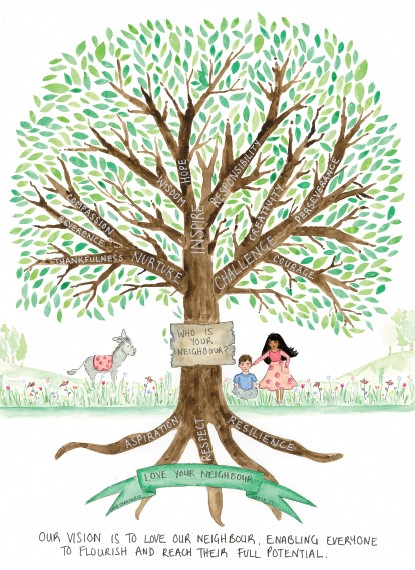British Values
In accordance with the Department of Education, we aim to promote Fundamental British Values within our federation to ensure children leave our schools prepared for modern life in Britain. As a federation, we use Jigsaw to teach our PSHE/RSE curriculum and British Values are intertwined throughout our PSHE teaching. Below is a link showing our Jigsaw topics and how British Values is taught within it.
British Values in Jigsaw
Our school Vision is 'To love our neighbour, enabling everyone to flourish and reach their full potential.'
Our values as a federation are
- Respect
- Nurture
- Challenge
- Resilience
- Inspiration
- Aspiration
We believe that these values underpin our ethos and teaching within our schools, and they are intertwined throughout promoting British Values within our federation.
Being part of Britain
As a school, we value and celebrate the diverse heritages of everybody at Woodton and Ellingham. Alongside this, we value and celebrate being part of Britain. In general terms, this means that we celebrate traditions, such as customs in the course of the year, for example, Remembrance during the Autumn term, and the occasional trip to a pantomime around Christmas time (what could be more British than that!). We also value and celebrate national events, such as anti-bullying
Further, children learn about being part of Britain from different specific perspectives, for example, in Geography we learn about our local area and how it differs to other areas of Britain and countries around the world and in Science we learn about British plants that grow around us.
Democracy
Children, parents and staff have many opportunities for their voices to be heard at our schools. Democracy is important for all members of our school community.
An obvious example is our School Council. It is made up of pupils from each class and the School Council meets regularly to discuss issues raised by the different classes. The council has its own budget and is able to genuinely effect change within the school. The Council are actively involved in recruitment and in providing teachers with feedback.
Other examples of ‘pupil voice’ are:
- children agree their Class Charter and the rights associated with these; all children contribute to the drawing up of the charter
- using Pupil Feedback forms, children are asked to respond and reflect on the teaching and learning
- some classes support charities which they have to vote on within their class, for example, Swallows are supporting a child in Togo.
Pupils are always listened to by adults and are taught to listen carefully and with concern to each other, respecting the right of every individual to have their opinions and voices heard. We encourage pupils to take ownership of not only their school but also of their own learning and progress. This encourages a heightened sense of both personal and social responsibility and is demonstrated on a daily basis by our pupils.
Rules and Law
The importance of rules and laws, whether they be those that govern our school or our country, are referred to and reinforced often, such as in assemblies and when reflecting on behaviour choices. At the start of the school year, a class might discuss and set its own Class Charter, a set of principles that are clearly understood by all and seen to be necessary to ensure that every class member is able to learn in a safe and ordered environment.
Pupils are taught the value and reasons behind laws, that they govern and protect us, the responsibilities that this involves, and the consequences when laws are broken. These values are reinforced in different ways:
- visits from authorities such as the police and fire service
- during Religious Education, when rules for particular faiths are thought about
- during other school subjects, where there is respect and appreciation for different rules – in a sports lesson, for example
- During our Jigsaw PSHE lessons
Individual Liberty
Alongside rules and laws, we promote freedom of choice and the right to respectfully express views and beliefs. Through the provision of a safe, supportive environment and empowering education, we provide boundaries for our young pupils to make choices safely; for example:
- choices about what learning challenge or activity
- choices about how they record their learning
- choices around the participation in extra-curricular activities
Our pupils are encouraged to know, understand and exercise their rights and personal freedoms and are taught how to exercise these safely, such as in our e-safety and forest schools lessons.
Mutual respect and tolerance of those with different faiths and beliefs
Our schools are small village schools set within Norfolk and therefore we do not have as much diversity as other schools.
Our pupils know and understand that it is expected and imperative that respect is shown to everyone, whatever differences we may have, and to everything, whether it is a school resource, a religious belief or whatever. Respect is one of our school values and is a theme for a half term. Children learn that their behaviour choices have an effect on their own rights and those of others. All members of the school community should treat each other with respect.
Specific examples of how we at Woodton and Ellingham enhance pupils understanding and respect for different faiths and beliefs are:
- through Religious Education and other lessons where we might develop awareness and appreciation of other cultures – in English through fiction and in Art by considering culture from other parts of the world, for example
- enjoying a depth of study during community themed weeks, where sometimes we will celebrate and enjoy learning about the differences in countries and cultures around the word (whilst at other times we might consider groups or individuals who might be vulnerable in some way, such as those with mental health issues
- During our daily collective worship, where we teach our values and what they mean for us as a federation.
Opposing Extremism
Something which is clearly not part of any British or European value is extremism. It is important to remember that whilst the threat from so-called Islamic State has been a focus in the Counter Terrorism and Security Act, the Prevent Duty is clear that extremism of all kinds should be tackled too. In England, far right groups such as Britain First and the English Defence League need to be tackled, too. Extremism is not a new topic in education, but schools have a relatively new statutory duty to pay “due regard to the need to prevent people from being drawn into terrorism”.
Read the government’s Prevent duty guidance and its guidance for schools.



